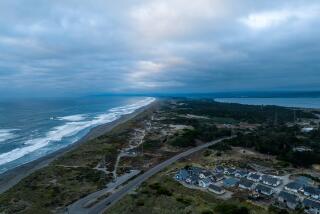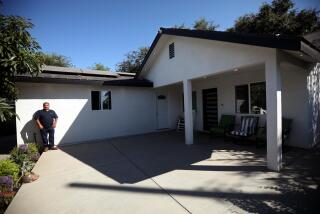California developers add a touch of luxury to the ‘agrihood’ trend
The setup is picture perfect: residents coming together to cooperatively farm and enjoy the fruits of their labor.
Whether the backdrop is a bucolic pasture in rural Illinois or an urban garden nestled in the concrete streets of Detroit, “agrihoods” have been blossoming this decade.
Though the term is still a nebulous one, the Urban Land Institute defines the trend as “development-supported agriculture or residential developments that revolve around working farms.”
Agrihoods across the country are attracting people seeking community, a return to nature and a farm-to-table diet. California developers, though, are hoping to cash in by shifting the amenities to suit a wealthier demographic.
In September, Signature Group Investments announced Walden Monterey, a luxury agrihood community set on 600 acres of the Monterey Peninsula. Each of the 22 lots, which will hold one house each, costs $5 million and features 20 acres of land.
The site’s developer, Nick Jekogian, originally planned to design the community as a group of large Mediterranean homes surrounding a golf course but changed his mind after spending a few nights in a tent on the peninsula.
“I would get up early in the morning and hike across the property until the evening to get a feel for the terrain,” Jekogian said. “After thinking deeper, I realized we had an unbelievable asset on our hands.”
He reimagined the development as an eco-friendly neighborhood that utilized nature without destroying it. Though no vertical construction is yet underway, Jekogian’s team of architects and environmental engineers has created some mock-ups of the custom homes.
Several architecture firms have signed on to design homes in Walden Monterey, but future owners will not be kept from working with their own architects to design and build their own creations.
One property, designed by Larson Shores Architects, is a 3,500-square-foot home that draws from the structure of Spanish moss. Split into three parts and seemingly growing down the knoll on which it rests, the house is clad in bronze weathered steel and features asymmetrical rooflines that complement the rugged topography.
Another design, which revolves around sustainability, is a 5,000-square-foot glass box home, most of which doesn’t physically rest on the ground — something that ensures minimal impact on the land below. Axelrod Architects included a 3,000-square-foot rooftop available for solar panel installation.
You’ll be hard-pressed to find a farmer in this agrihood, however. Jekogian is hoping the luxury digs, which are an hour drive from Silicon Valley, can attract a tech-minded demographic.
“People are looking for a deeper connection with nature, which they don’t get by staring at a screen all day,” Jekogian said. “The Silicon Valley crowd are literally part of the reason we’re staring at our phones so often.”
The Walden Monterey will include a communal farm, a sunrise yoga platform, a treehouse and Zen meditation gardens.
Four hundred miles southeast, in Palm Springs, another luxury agrihood is set to open late next year.
Developed by Freehold Communities, the collection known as Miralon will offer 1,150 midcentury-modern residences that cost $300,000 to $700,000.
The homes will be built around 70 acres of olive trees grown in place of a former golf course. Golf cart paths will be turned into hiking trails, and tee boxes and greens will transform into dog parks, exercise stations and social areas with fire pits and Wi-Fi.
“This development is rooted in health and wellness, and as more people look to improve their lifestyle, they’re more attracted to opportunities like this,” said Brad Shuckhart, Freehold’s communities division president.
He wants agrihood to be a community that offers the ability to interact and participate in the production and cultivation of the foods that residents ultimately consume.
Olive oil from Miralon’s orchard will be pressed on-site, and food from the 11,000-square-foot community garden will go straight to residents’ tables.
Although some traditional agrihoods primarily feature a farm, garden and a collection of houses, Miralon hopes to fill the spots by offering an amenity center equipped with a pool, spa, gym and a full-service bar and lounge.
Twitter: @jflem94
More to Read
Sign up for Essential California
The most important California stories and recommendations in your inbox every morning.
You may occasionally receive promotional content from the Los Angeles Times.







